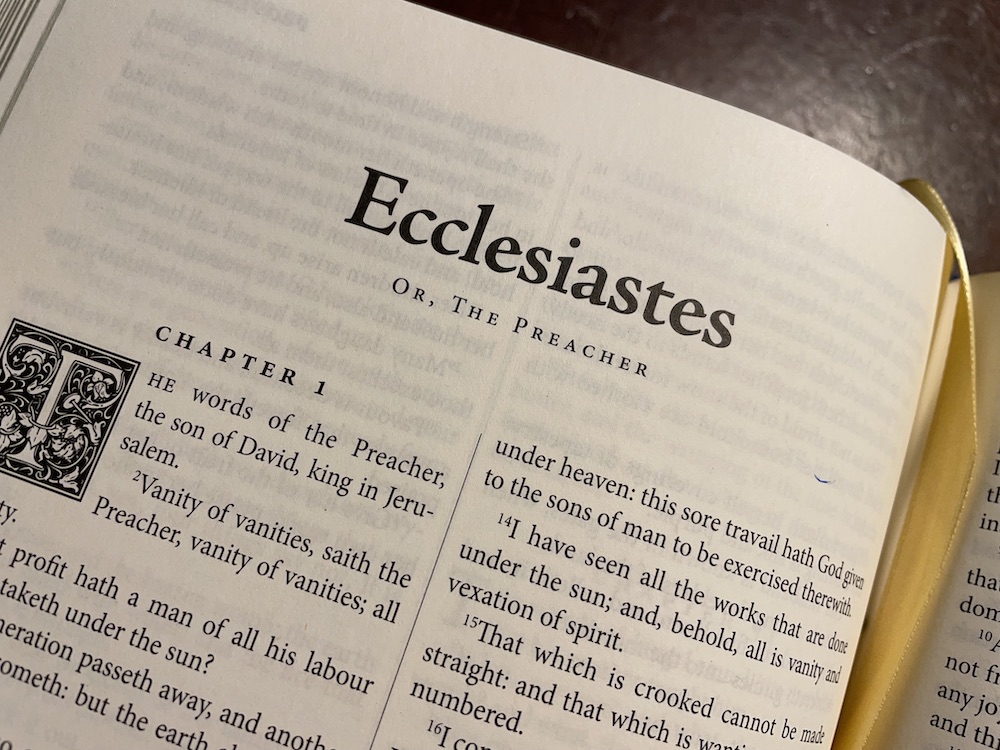
Ecclesiastes 10
Ecclesiastes 10:1–20, More wise counsel. In this chapter, the Preacher gives his student more wise counsel on how to derive the most fulfillment out of an otherwise seemingly meaningless and pointless existence as a human being trapped in a spaceship called planet Earth.

Ecclesiastes 10:1, Dead flies. Even the smallest error, sin or folly (the opposite of wisdom) can lead to disastrous consequences and ruination, thus, a wise person will correct the small defects in his character, so that they do not ultimately ruin him. Regular self-examination leading to correcting one’s errant ways is to choose the path of wisdom. So deal with your sins and faux pas while they are still small and before they get out of hand.
Ecclesiastes 10:2, Right…left. A wise man follows the right hand path, while a fool goes in the left direction. In Hebraic thought, the right hand represents strength while the left hand symbolizes weakness. This is because most people are right handed and, therefore, they use their right hand more than the left hand making the right arm and hand stronger muscularly. Even in our modern vernacular we have the expression “the right way,” or “doing the right thing” as meaning to make the preferable choice between right and wrong, good and evil. Wisdom is strength while foolishness is weakness.
Ecclesiastes 10:3, Even when a fool. Sadly, a fool cannot help himself because he has become accustomed to his condition and willingly chosen to be blind. Those around him can see that he is foolish in the choices he makes, but since his eyes are shut, he continues blithely on his foolish path.
Ecclesiastes 10:4, Conciliation. When wrongs are committed whether real or imagined, especially in relationship to those in authority over you, be quick to make peace, for it will go much better for you in the long run. Moreover, stay small and keep a low profile when it comes to interaction with civil authorities, for such a position draws less attention to your actions and less chances of conflict and even persecution.
Ecclesiastes 10:5–7, There is an evil. Just because a person has attained a high position of authority does not mean that they are wise. Similarly, just because one has a low social status does not mean that they are a fool. This truth considered in the context of verse four teaches us something: Sometimes those in authority over you are fools who are incapable of make wise and equitable decisions, especially in the area of resolving controversies. This is all the more reason to make peace with these leaders be they foolish or wise when a matter of disagreement is small before it goes too far and gets blown out of proportion causing all sorts of mischief and grief for all involved.
Ecclesiastes 10:8–9, He who digs a pit. What goes around comes around. How we treat others, whether well or badly, will come back to us.
Ecclesiastes 10:10, If the ax is dull. A wise person learns to work smarter, not harder.
Ecclesiastes 10:11–14, The babbler. Beware of the words of a foolish blabber mouth, that is, one who talks incessantly and says little or nothing of meaning. Mischief and poison issue forth from such a person, for they are untrustworthy and their words means nothing. In our vernacular we refer to such a person as “a talker” as opposed to being “a doer.”
Ecclesiastes 10:11–15, The labor of fools. A fool is so lazy and lost in his foolishness that after working he is so enervated that he cannot even find his way back home. Foolishness not only robs a person of the energy to work hard, but also causes one to lose one’s direction in life.
Ecclesiastes 10:16–18, Woe to you, O land. A country suffers grievously when young and foolish people who want to play and party all of the time are its leaders. Blessed s the country whose leaders have a heritage of hard work and responsibility and not of slothfulness and partying. Decay and ruination are the result of sloth and laziness.
Ecclesiastes 10:19, Money answers everything. Partying and drinking may be fun, for it is full of boasting and bravado, but this accomplishes nothing. Unless one puts one’s money where their mouth is, nothing gets done. “Put up or shut up,” and “Show me don’t tell me,” as the sayings go.
Ecclesiastes 10:19, Do not curse the king…a bird. Bad thoughts lead to bad words which lead to bad actions that eventually come back to bite a person.
Moreover, this verse instructs us: “Do not curse the king, even in your thought; do not curse the rich, even in your bedroom; for a bird [Heb. owf] of the air may carry your voice, and a bird [Heb. baal] in flight may tell the matter.”
This verse is very revealing regarding what goes on in the unseen spiritual realm where Satan is the prince of the power of the air (Eph 2:2) and the ruler of this world (John 16:11).
The phrase in this verse is a parallelism—a form of Hebrew poetry where two phrases are juxtaposed and appear to be saying the same thing, but, in this case, a subtle spiritual truth is being revealed in the second phrase. In the first phrase, the word for bird is a generic Hebrew word meaning “a bird, a winged creature or a winged insect.” The second phrase reveals the subtle truth. It is telling us to be careful what you say or even think—even in private, for a god (or demon) might reveal it to its lord or king. In other words, a false god or demon spirit might convey what you’ve thought or said to its demon master, or even to Satan, who is the god of this age (2 Cor 4:4). And who knows where it will go from there.
With regard to prayer, we must remember this: “For we do not wrestle against flesh and blood, but against principalities, against powers, against the rulers of the darkness of this age, against spiritual hosts of wickedness in the heavenly places” (Eph 6:1). In light of this reality and concerning prayer, it is vital that we remember this: When making intercession for situations or people or praying against the enemies of Elohim or engaging in spiritual warfare against Satan and his plans, ask YHVH to cover your prayers under the blood of Yeshua (Rev 12:11), to bind the (demonic) strong man (Matt 12:29; Mark 3:26–27 cp. Rev 20:2), to send his angels to protect you against the enemy’s plans to thwart your prayers (Ps 91:11–12; Heb 1:14), and to send confusion to our spiritual enemies (Ps 35:4, 26; 40:14; Jer 20:11).
It is essential that we employ this strategy against our spiritual adversary, so that he will not be able to hear our prayers and thus be able to prepare a defensive plan or a punishing backlash against us to prevent our prayers from being effective. When he succeeds in this, the result is often unanswered prayers causing the saint to become discouraged, so that he prays less often rather than more—a victory for the evil one.
Perhaps this is why some of our prayers go unanswered or seem ineffective; it is because we are inadvertently revealing our plans to the enemy thus allowing him to thwart them.


Ecclesiastes 10:20
“Don’t insult a king…a bird.”
Sheep to the right and goats, or is it donkeys, to the left.
Shalom, John